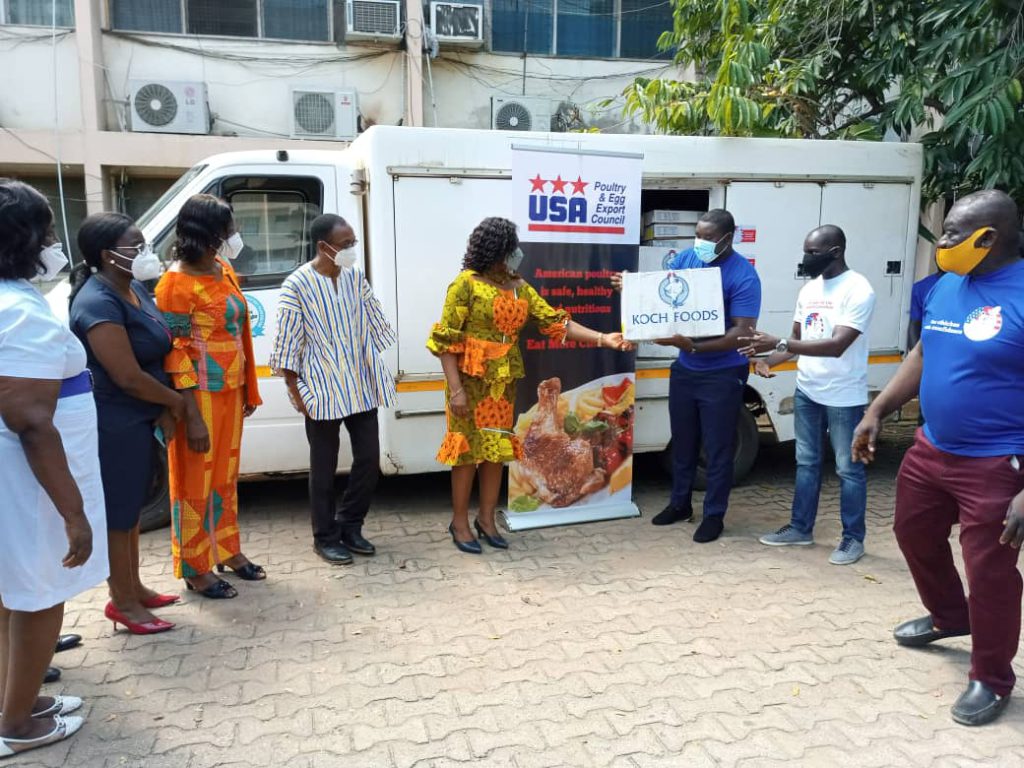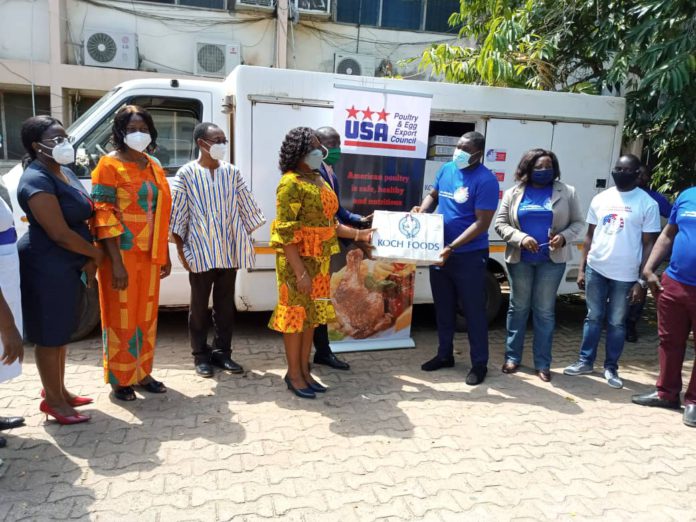The United States of America (USA) Poultry and Egg Export Council (USAPEEC), an advocate for the poultry industry on trade policy issues, has donated 50 cartons of poultry products to COVID-19 frontline health workers and patients housed across four treatment and isolation centres in Accra.
The products were presented to the Greater Accra Regional Health Directorate during a short ceremony at the Greater Accra Regional Coordinating Council.
During the presentation, Leonard Amissah, the Stock Accountant of Perez Foods, said the organisation, in collaboration with USAPEEC, identifies with the impact of the Covid – 19 pandemic on the Ghanaian economy and all the efforts the government is puting in place to mitigate the effect.

He said that the two organisations, therefore, saw the need to make the donation to support the government’s effort in reducing the impact of the pandemic on the citizens.
Receiving the items on behalf of the Health Directorate, Dr Charity Sarpong, the Greater Accra Regional Health Director of Ghana Health Service, expressed appreciation for the intervention which, she said, will go a long way to improve the dietary requirements of the patients, who have had to leave family and friends in order to keep them safe.
The Regional Director expressed worry over the level at which people across the country are disregarding the COVID-19 protocol.
According to her, the development is a serious threat to the gains realised in the fight against the COVID-19 pandemic. She said that a more responsible society is needed to ensure that the chain of transmission is broken to make the country return life back to normalcy.
“We want to come to a place where there is zero transmission; which would mean that Ghana is free of COVID-19 and then together we will all rejoice. These days when you go out, you see that people are not wearing the face mask and even those who have it on are not wearing it the way they should. We are thinking that it is over but it is not over yet. So far as we have active cases it is not over,” she added.
According to Dr Sarpong, in March 2020, the country had two cases: “But then we saw an increase and so till we get to a point where there are no active cases, zero transmission is broken, that is when we can say that we are free of COVID-19.”
She pleaded with everyone that when it comes to the 2020 elections as well as Christmas celebrations, Ghanaians need to be wise and ensure that they are well protected so that come January 2021, the country does not experience a spike in the number of cases.
It could be recalled that since the country recorded its first case in March, 2020, 47,991 people have been infected by the virus. Out of this figure, 320 people have died and 47,136 have recovered.
As at October 29, 2020, the country had 535 active cases and 83 new cases; Greater Accra Region is leading with 331 followed by Bono Region with 34 cases and Ashanti Region with 18 cases.
USAPEEC has evolved from an association whose major purpose was the promotion of US poultry and egg products through its network of 13 international offices and consultants, to an organisation that is an advocate for the industry on trade policy issues.
Despite this, USAPEEC has never strayed from its roots as a promotional organisation. Throughout the world, USAPEEC touts the high quality of American poultry and egg products.
All US poultry for export and local consumption is inspected and approved by the US Department of Agricultures’ (USDA) Food Safety and Inspection Service (FSIS). The USDA is regarded as the highest authority on food inspection in the world.
Chicken imports into Ghana from the USA are inspected by the USDA Food Safety and Inspection Services and the Ghana Food and Drug Authority to ensure product safety.
US chicken is naturally large and plump due to good breeding, proper nutrition, rigorous veterinary care and excellent living conditions.

